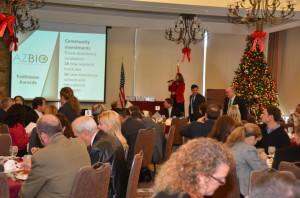Estimated at $20B, the Medial Device Tax was included in the Affordable Care Act that was signed into law by President Obama in 2010. The amount is based on a 2.3% excise tax that will be levied on the total revenues of a company, regardless of whether a company generates a profit, starting in 2013.
While many industry groups including AZBio, AdvaMed, and MDMA have been sharing information on why this tax is unwise and have worked to explain the negative effects that it could have on innovation and patient care, there is always the possibility that it will not be repealed before 2013.
Ernst and Young recently published a Tax Note on the Medical Device Tax that gives a comprehensive overview of what it is, who it affects and how they will be affected. The tax note is provided below as published by E&Y and is shared with permission.Continue reading

 On Aug. 26, 1976, a time bomb exploded in Yambuku, a remote village in Zaire, (now the Democratic Republic of the Congo). A threadlike virus known as Ebola had emerged, soon earning a grim distinction as one of the most lethal, naturally occurring pathogens on earth, killing up to 90 percent of its victims, and producing a terrifying constellation of symptoms known as hemorrhagic fever.
On Aug. 26, 1976, a time bomb exploded in Yambuku, a remote village in Zaire, (now the Democratic Republic of the Congo). A threadlike virus known as Ebola had emerged, soon earning a grim distinction as one of the most lethal, naturally occurring pathogens on earth, killing up to 90 percent of its victims, and producing a terrifying constellation of symptoms known as hemorrhagic fever.


 Peoria will soon play host to bioscience startups, with the lofty long-term goal of becoming a bioscience hub focused on medical devices that would bring high-paying jobs to the city.
Peoria will soon play host to bioscience startups, with the lofty long-term goal of becoming a bioscience hub focused on medical devices that would bring high-paying jobs to the city.